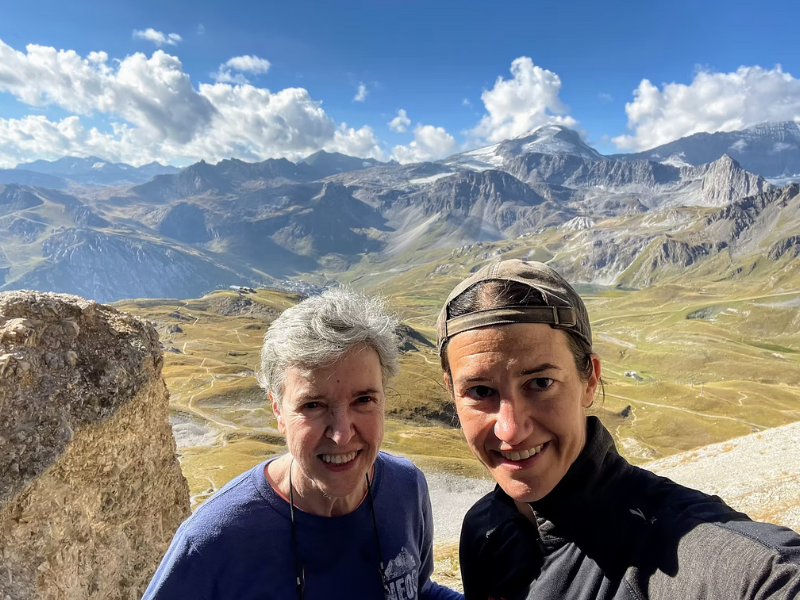Jane Bertrand 'highpointing' next stage of her life, work
After nearly four decades of teaching and research at Tulane University as part of a memorable public health career, Dr. Jane Bertrand might know a thing or two about international family planning.
That knowledge and experience will continue to benefit the Celia Scott Weatherhead School of Public Health and Tropical Medicine well into the future, even though she made her retirement official in December 2024.
“I do not know anyone who goes to the family planning and is indifferent to the topic,” Bertrand says. “People go into it because they feel very passionately about it, and I would certainly put myself in that category.”
Bertrand spent 37 of the 46 years of her professional career at Tulane, with an eight-year hiatus at Johns Hopkins in the 2000s. From 2010-24, she held the Neal A. and Mary Vanselow endowed chair. While at Tulane, she divided her efforts between academic work (teaching, mentoring graduate students, and publishing) and sponsored research (managing funded projects internationally). Her areas of specialization included family planning programming, program evaluation, social and behavior change communication, and HIV prevention.
During those same years, Bertrand obtained over $60 million in external funding to support Tulane’s work in family planning and program evaluation in the Democratic Republic of the Congo (DRC). She closed this chapter of her career with the publication of a book entitled Fifty Years of Family Planning in the Democratic Republic of the Congo: The Dogged Pursuit of Progress (Routledge 2024).
Tulane’s work in the DRC will continue under the leadership of Associate Professor Dr. Julie Hernandez, the current principle investigator for Tulane’s DRC projects, and Dr. Arsene Binanga, the country director based in Kinshasa. As Bertrand points out, those programs are in exceedingly capable hands. “As a native French speaker, Julie has a tremendous comparative advantage of being able to operate in a Francophone country, and she has 15 years of field experience on the ground. Over the past decade, we’ve worked very closely together, and she too has become a true crusader for family planning.”
Bertrand intends to follow the example of her predecessor at Johns Hopkins as executive director of the Center for Communication Programs. Bertrand assumed that role in 2001. “My predecessor was a giant in our field. Yet after three months of overlap, she handed the job over to me and never meddled in the center’s work. It was such a gift that she entrusted me with the leadership. And I would like to do the same for Julie.”
In her new role as professor emerita, Bertrand is focusing her efforts on two projects: one professional, one personal. In August 2025, she received IRB approval for a qualitative study entitled “On the frontlines of international family planning.” For this study, she is interviewing Tulane alumni who received master’s or doctoral degrees from Tulane and went on to work in international family planning. Through their experiences, she will trace the arc of the international family planning movement from the 1970s (when Louisiana was widely recognized as having the most effective family planning program in the United States) to the recent dismantling of USAID, in which many alumni lost their jobs. Alumni posted overseas have endured earthquakes and civil unrest in their quest to ensure that women and girls worldwide have access to the means of controlling their fertility.
Bertrand’s initial list of potential respondents included some 50 names, but through snowball sampling (“who am I missing?”), it is now closer to 100. Bertrand knew the majority of these individuals personally, though she hadn't seen some of them in over 30 years. “If there is a hidden agenda in this project,” Bertrand concedes, “it is to reconnect with students I have known over the years of teaching at Tulane.” The final product will reflect the important contribution that Tulane has made to international family planning for over five decades.
Her second project is “Aiming for 80.” Almost two decades ago, Bertrand discovered the pastime of highpointing (attempting to reach the highest point in every state of the U.S.) and wrote a book about it, You Started What after 60? Highpointing across America. During the book launch that coincided with her 70th birthday, friends asked, “What's next?
This question gave birth to “Aiming for 80,” which involves completing “Eight Annual Extraordinary Outdoor Excursions” between ages 70 and 79. On her 80th birthday, Bertrand wants to look back on these adventures as among the happiest moments of the decade. The criteria for these excursions are (1) an activity that requires some physical challenge, (2) in a setting with stunning natural beauty. “This admittedly corny gimmick has proven extremely motivational, since anyone living in Louisiana and interested in hiking must deliberately plan to go somewhere else,” she explains. With three years yet to go, Bertrand has completed 59 of the 80 excursions and has chronicled many of them on her blog janebertrand-blog.com
The Bertrand/Hernandez collaboration spilled over from family planning to the Great Outdoors. Julie Hernandez, a world-class mountaineer who trained in alpine rescue as a high schooler and has put her climbing skills to the test in Nepal, is frequently part of the 80 excursions. Any mentoring that Bertrand provided to Hernandez in international family planning is being repaid with her services as guide, coach, and sherpa on these adventures.

